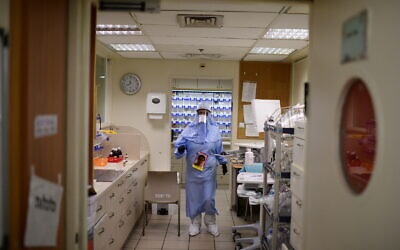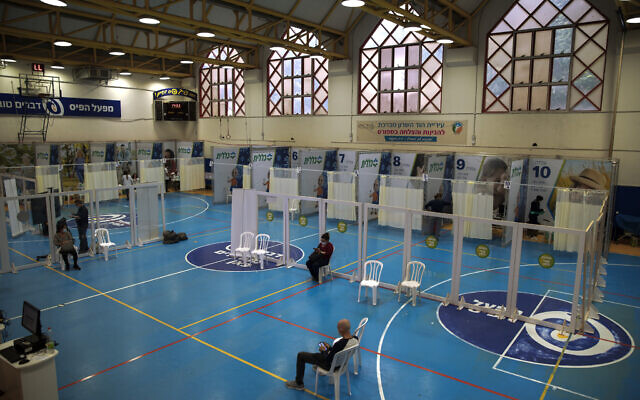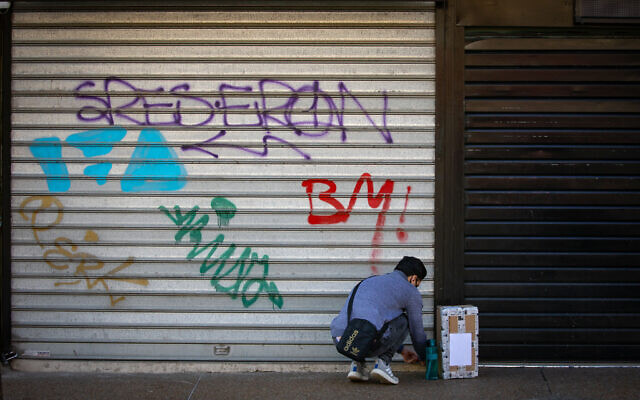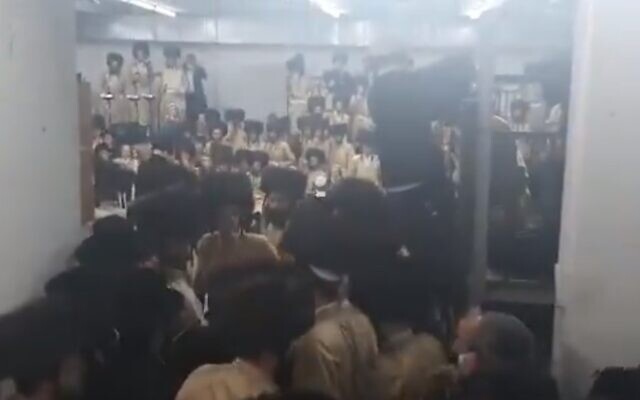The number of seriously ill COVID-19 patients in Israel continued to near an all-time record on Thursday as vaccination rates started to tail off and the country prepared to enter a new tightened lockdown starting midnight.
The Health Ministry said 7,820 new cases were confirmed on Wednesday, after the tally had surpassed 8,000 two days in a row.
There were 127,140 tests conducted on Wednesday, the highest level since the pandemic began. The percentage of positive tests was slightly down at 6.2 percent.
The total number of confirmed cases in the country rose to 466,377, meaning that more than 5% of Israel’s population, one in every 20 people, have now been infected.
There were 64,180 active cases — nearing the record of over 72,000 active cases reached in late September.

Staff wearing protective gear at the coronavirus department of Ichilov hospital in Tel Aviv, on January 1, 2021. (Tomer Neuberg/Flash90)
Of them, 873 were in serious condition — also nearing an all-time high — including 210 on ventilators and 259 in critical condition. Another 234 were in moderate condition, and the rest had mild or no symptoms.
The death toll stood at 3,527.
Health Minister Yuli Edelstein announced that 93,000 people were inoculated in Israel on Wednesday, as the vaccination rate appeared to begin to tail off. The number of people receiving the shot against COVID-19 in Israel had reached around 150,000 per day.
Some 1,593,000 people have now been vaccinated in Israel, but the healthcare system is facing a shortage of doses that may force health providers to slow the pace of new inoculations.
Health officials have said the country will prioritize second doses in the coming weeks, and that there are enough vaccines to supply those doses to everyone who has received a first dose.

Israelis wait to receive coronavirus vaccine at a COVID-19 vaccination center, set up on a basketball court in Hod Hasharon, near Tel Aviv, Jan. 6, 2021. (AP Photo/Oded Balilty)
As a first shipment of the Moderna vaccine was set to arrive in Israel, the Health Ministry said in a statement that the mixing of doses from two different pharmaceutical companies would be permitted in extreme circumstances. Until now, Israel has only deployed the Pfizer-BioNTech vaccine as part of its efforts to stamp out the pandemic.
“For patients who received one dose of a particular vaccine that is not available at the time of the second dose, or if it is not possible to know which vaccine was given in the first dose but at least 28 days have passed since that dose, one dose of the available vaccine should be given,” the Health Ministry said.
“This alternative should be preferred if the patient is at immediate high risk or there is doubt as to whether they will return [on another occasion]. In these circumstances, it is likely that the second dose will increase the response to the first dose,” the ministry said.
The ministry additionally said that anyone diagnosed with coronavirus after receiving a first dose of a vaccine would not receive a second dose.
The data and guidance were released as police were gearing up to enforce tighter lockdown rules set to take effect Thursday night, vowing officers would act against violators.

A man on Jerusalem’s Jaffa Street on January 6, 2021, during the 3rd lockdown due to the coronavirus pandemic (Olivier Fitoussi/Flash90)
Government ministers voted Tuesday night in favor of tightening the current nationwide lockdown by shuttering schools and nonessential businesses for two weeks, with the aim of cutting rising daily infections.
Additionally, starting at midnight all travelers returning from the United Kingdom and South Africa, where new strains of the virus have been spreading, will be required to enter a state-run hotel for their quarantine period. Returnees from all other countries will undergo virus tests at the airport before entering mandatory isolation at home.
Checkpoints will be set up on major highways and within towns and cities. The current rules — which have largely been ignored and under-enforced — already limit Israelis from venturing beyond a kilometer from their homes, except for essential reasons.
Coronavirus czar Nachman Ash, who is spearheading the national effort, said on Thursday, “This time we must ensure that all places in all sectors are closed. The outbreak in the ultra-Orthodox community is more significant. Full enforcement cannot be waived.”
At least two mass weddings were held in the ultra-Orthodox community on Tuesday despite the high infection rates. Consequently, several police officers were suspended while an inquiry was to be held over why one celebration, in the Beitar Illit settlement, was allowed to proceed.

Hundreds of ultra-Orthodox men from the Toldos Aharon Hasidic dynasty attend a wedding in Beitar Illit, violating coronavirus regulations, January 5, 2021. (Screenshot: Twitter)
The announcement came after a photo circulated on social media showing an officer bowing as he received a blessing during the event, surrounded by unmasked Hasidic revelers.
Anonymous police officials told the Haaretz daily that officers wouldn’t take action against Haredi schools that remain open in violation of the lockdown.
Meanwhile, one of the most influential spiritual leaders of the ultra-Orthodox community urged his followers to heed the government lockdown regulations and the instructions from the medical establishment, but Rabbi Chaim Kanievsky didn’t refer explicitly to whether schools should remain open, following reports that he had instructed Haredi institutions to keep running despite the countrywide shutdown.
Kanievsky has in the past ordered ultra-Orthodox schools to remain open as lockdown measures were in force.
Related posts:
Views: 0
 RSS Feed
RSS Feed

















 January 7th, 2021
January 7th, 2021  Awake Goy
Awake Goy  Posted in
Posted in  Tags:
Tags: 
















